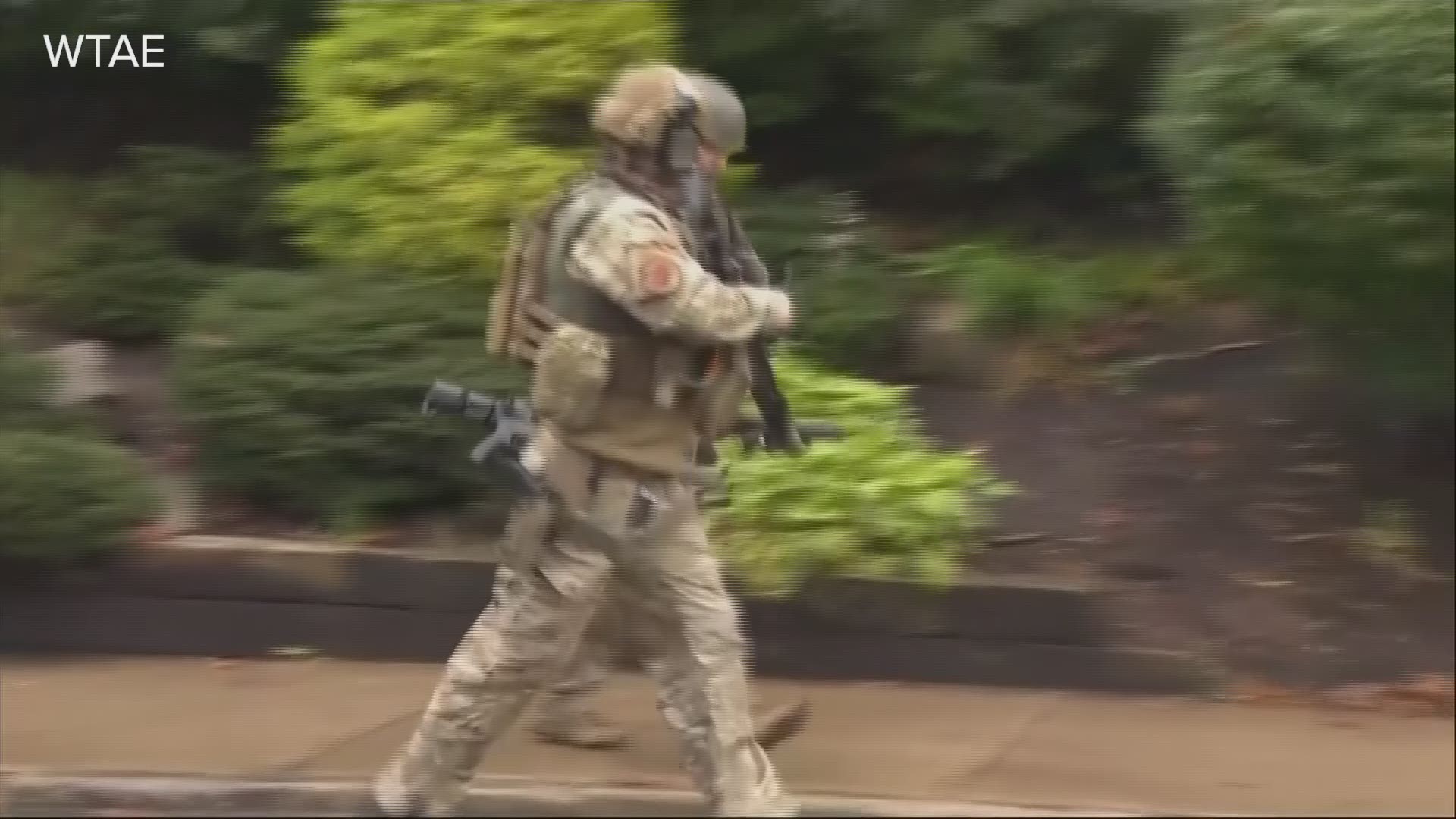PITTSBURGH — The suspect in the mass shooting at a Pittsburgh synagogue expressed hatred of Jews during the rampage and told officers afterward that Jews were committing genocide and he wanted them all to die, according to charging documents made public Sunday.
Robert Gregory Bowers killed eight men and three women inside the Tree of Life Synagogue on Saturday during worship services before a tactical police team tracked him down and shot him, police said in an affidavit, which contained some unreported details on the shooting and the police response.
Officials released the names of all 11 victims during a news conference Sunday, all of them middle-aged or elderly. The victims included a pair of brothers and a husband and wife. The oldest was 97.
Mayor Bill Peduto called it the "darkest day of Pittsburgh's history."
Calls began coming in to 911 from the synagogue just before 10 a.m. Saturday, reporting "they were being attacked," court documents said. Bowers, 46, shot one of the first two officers to respond in the hand, and the other was wounded by "shrapnel and broken glass."
A tactical team found Bowers on the third floor, where he shot two officers multiple times, the affidavit said. One officer was described as critically wounded; the document did not describe the other officer's condition.
Two other people in the synagogue, a man and a woman, were wounded by Bowers and were in stable condition, the document said.
Bowers, who was armed with an AR-15 rifle and three handguns, told an officer while he was being treated for his injuries "that he wanted all Jews to die and also that they (Jews) were committing genocide to his people," the affidavit said.
A law enforcement official says the man accused of killing 11 people at a Pittsburgh synagogue had a license to carry firearms and legally owned his guns.
Bowers was charged late Saturday with 11 state counts of criminal homicide, six counts of aggravated assault and 13 counts of ethnic intimidation in what the leader of the Anti-Defamation League called the deadliest attack on Jews in U.S. history.
Bowers was also charged Saturday in a 29-count federal criminal complaint that included charges of obstructing the free exercise of religious beliefs — a federal hate crime — and using a firearm to commit murder. U.S. Attorney General Jeff Sessions said the charges "could lead to the death penalty."
It wasn't clear whether Bowers had an attorney to speak on his behalf.
The nation's latest mass shooting drew condemnation and expressions of sympathy from politicians and religious leaders of all stripes. With the midterm election just over a week away, it also reignited a longstanding and bitter debate over guns.
Pope Francis led prayers for Pittsburgh on Sunday in St. Peter's Square.
"In reality, all of us are wounded by this inhuman act of violence," he said. He prayed for God "to help us to extinguish the flames of hatred that develop in our societies, reinforcing the sense of humanity, respect for life and civil and moral values."
German Chancellor Angela Merkel's spokesman quoted Merkel on Twitter as offering her condolences and saying that "all of us must confront anti-Semitism with determination — everywhere."
German President Frank-Walter Steinmeier wrote in a condolence message to President Donald Trump that "this abhorrent crime reminds us all to do what is in our power to advocate against hatred and violence, against anti-Semitism and exclusion, and to counter with determination those who incite them."
Trump on Saturday said the outcome might have been different if the synagogue "had some kind of protection" from an armed guard, while Pennsylvania's Democratic Gov. Tom Wolf, up for re-election, noted that once again "dangerous weapons are putting our citizens in harm's way."
Calling the shooting an "evil anti-Semitic attack," Trump ordered flags at federal buildings throughout the U.S. to be flown at half-staff in respect for the victims. He said he planned to travel to Pittsburgh, but offered no details.
In the city, thousands gathered for a vigil Saturday night. Some blamed the slaughter on the nation's political climate.
"When you spew hate speech, people act on it. Very simple. And this is the result. A lot of people dead. Senselessly," said Stephen Cohen, co-president of New Light Congregation, which rents space at Tree of Life.
Little was known about Bowers, who had no apparent criminal record but who is believed to have expressed virulently anti-Semitic views on social media. Authorities said it appears he acted alone.
Worshippers "were brutally murdered by a gunman targeting them simply because of their faith," Bob Jones, head of the FBI's Pittsburgh office, said Saturday, though he cautioned the shooter's full motive was not yet known.
Scott Brady, the chief federal prosecutor in western Pennsylvania, pledged that "justice in this case will be swift and it will be severe."
The gunman targeted a building that housed three separate congregations, all of which were conducting Sabbath services when the attack began just before 10 a.m. in the tree-lined residential neighborhood of Squirrel Hill, about 10 minutes from downtown Pittsburgh and the hub of Pittsburgh's Jewish community.
During the week, anyone who wanted to get inside Tree of Life synagogue had to ring the doorbell and be granted entry by staff because the front door was kept locked. Not so on Saturday — the Jewish Sabbath — when the building was open for worship.
The synagogue door was unlocked on the Sabbath "because people are coming for services, and the bell would be ringing constantly. So they do not lock the door, and anybody can just walk in," said Marilyn Honigsberg, administrative assistant for New Light. "And that's what this man did."
Michael Eisenberg, the immediate past president of the Tree of Life, said synagogue officials had not gotten any threats that he knew of before the shooting. But security was a concern, he said, and the synagogue had started working to improve it.

